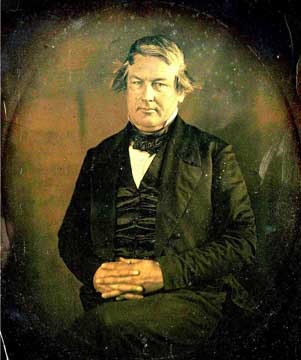Millard Fillmore

Millard Fillmore became President on the death of President Taylor. He was a born compromises and as a result the compromise of 1850 came into being.
The Early Years
Millard Fillmore was born in a log cabin in Locke Township, New York. As a young boy, Fillmore helped his father on the farm. At the age of 14, he became an apprentice clothmaker. Until the age of 17, he had very little schooling. When a circulating library was created in his town, he began to teach himself. At the age of 19 he enrolled in a recently established academy where he was a favorite of one of his teachers, Abigail Powers, whom he later married.
In 1819, he became clerk with a local judge, Judge Wood. In 1823, he was admitted to the bar. From 1829-1831, Fillmore served as a New York State Assemblyman. From 1833-1835 and then again from 1837, Fillmore served in the US House of Representatives. In 1843 Fillmore became chair of the powerful House Ways and Means Committee. In 1849 Fillmore was elected Vice President.
Accomplishments in Office
Millard Fillmore was a born compromiser. While Taylor had remained immune to threats of Southern secession, Fillmore readily agreed to a series of Congressional compromises. California was admitted as a free state and the empty territories of New Mexico and Utah were created without restrictions.
As part of the compromise, slave trade was eliminated from the District of Columbia. Finally, a much stricter Slave Fugitive Act was passed, creating severe penalties for harboring escaped slaves. While the compromise was initially hailed, it was not long before sensibilities were once again inflamed. When Harriet Beecher Stowe wrote Uncle Tom's Cabin, she based her story on this compromise and its implications.
Fillmore's greatest accomplishment was in sending Commodore Perry to Japan, thus opening an avenue to the Far East
The First Family
Father Nathani Fillmore
Mother: Phoebe Millard Fillmore
Wife: Abigail Powers Fillmore(first)
Second Wife Caroline Carmichael McIntsoh
Son: Millard Powers
Daughter: Mary Abigail
Major Events
Compromise of 1850
Fugitive Slave act
California Gains Statehood
Uncle Toms Cabin
Perry Mission to Japan
The Cabinet
Secretaries of State:
Daniel Webster
Edward Everett
Secretary of Treasury:
Thomas Corwin
Secretary of War:
Charles Conrad
Attorney General:
John Crittenden
Secretary of Navy:
William Graham
John P. Kennedy
Postmaster General:
Nathan Hall
Secretary of the Interior:
Thomas McKennan
Alexander Stuart
Military
None
Did You Know?
